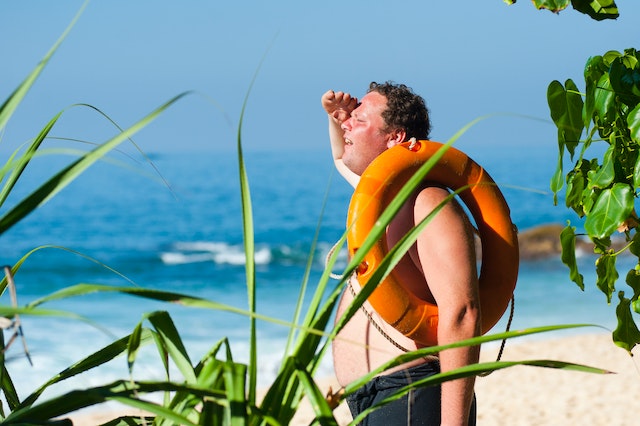
Spending time in the sun is a great way to enjoy outdoor activities, but protecting yourself from the harmful effects of ultraviolet (UV) radiation is important. However, it’s essential to know the common signs and symptoms of sun poisoning and when to seek treatment.
Whether you're planning a day at the beach, a hike in the mountains, or simply spending time in your own backyard, understanding the signs and risks of sun poisoning can help you stay safe and enjoy the sun responsibly.
What Is Sun Poisoning?
Sun poisoning, also known as photodermatitis, is a type of skin reaction that occurs when the skin is overexposed to the sun's UV rays. The condition is caused by a combination of factors, including genetics, skin type, and exposure to UV radiation. Unlike sunburn, which affects the top layer of the skin, sun poisoning affects the deeper layers of the skin and can cause more severe symptoms.
While anyone can develop sun poisoning, certain factors can increase the risk of developing the condition. People with fair skin, blonde or red hair, and blue or green eyes are more likely to experience sun poisoning. Additionally, medications such as antibiotics, diuretics, and nonsteroidal anti-inflammatory drugs (NSAIDs) can increase sensitivity to the sun and increase the risk of sun poisoning. Certain medical conditions, such as lupus and porphyria, can also increase the risk of sun poisoning.
Symptoms: What Does Sun Poisoning Look Like?
The symptoms of sun poisoning can vary from person to person, but there are several common signs to watch out for. These symptoms can appear within hours or days of exposure to the sun, and they can last for several days. The most common signs of sun poisoning include the following:
- Redness and swelling of the skin
- Itching and burning sensation
- Headache
- Nausea and vomiting
- Fever and chills
- Dehydration
- Dizziness
- Fatigue
If you experience any of these symptoms after spending time in the sun, it's important to take action to prevent further damage and seek medical attention if necessary.
Treatment of Sun Poisoning
If you experience symptoms of sun poisoning, there are several steps you can take to relieve discomfort and prevent further damage to your skin. Here are some treatment tips:
- Get out of the sun: The first step in treating sun poisoning is to get out of the sun and into a cool, shaded area.
- Drink plenty of fluids: Dehydration is a common symptom of sun poisoning, so it's important to drink plenty of fluids, such as water or sports drinks, to stay hydrated.
- Apply a cool compress: To relieve itching and burning, apply a cool, damp compress to the affected area.
- Take over-the-counter pain relievers: Over-the-counter pain relievers, such as ibuprofen or acetaminophen, can help relieve headaches and fever associated with sun poisoning.
- Use topical creams: Topical creams, such as hydrocortisone or aloe vera, can help soothe the skin and reduce inflammation.
- Seek medical attention: If your symptoms are severe or do not improve after a few days, seek medical attention. Your doctor may prescribe prescription-strength creams or medications to help alleviate your symptoms.
When to Seek Medical Attention
In most cases, sun poisoning can be treated at home with over-the-counter remedies and by staying out of the sun. However, there are certain situations where medical attention may be necessary.
- Severe pain: If you are experiencing severe pain, especially if it is accompanied by blistering or peeling of the skin, seek medical attention immediately.
- High fever: Seek medical attention if you have a high fever, particularly if it is accompanied by chills or other flu-like symptoms,
- Swelling or redness around the eyes: If you experience swelling or redness around the eyes, seek medical attention, as this can be a sign of a more serious condition.
- Fainting or loss of consciousness: Seek medical attention immediately if you faint or lose consciousness.
- Rapid heartbeat: If you have a rapid heartbeat, seek medical attention, as this can be a sign of heat exhaustion or heat stroke.
Sun Poisoning Prevention
One of the most effective ways to prevent sun poisoning is by taking measures to avoid it happening in the first place. Here are some ways to prevent sun poisoning:
- Wear protective clothing
- Use sunscreen
- Avoid peak sun hours
- Stay hydrated
- Be aware of medication side effects
Head to an American Family Care Location Near You for Treatment
If you do experience sun poisoning, it's important to seek treatment promptly. American Family Care (AFC) clinics offer fast and convenient medical care for sun poisoning and other urgent health issues. AFC is a trusted provider of high-quality healthcare services for individuals and families.
Don't let sun poisoning ruin your summer. Take steps to protect your skin and seek prompt medical attention if you experience symptoms. With the right care and attention, you can enjoy all the benefits of the great outdoors while keeping your skin healthy and safe.
Are you in need of prompt and convenient medical care for sun poisoning? Head to an AFC clinic for quick urgent care treatment today!

